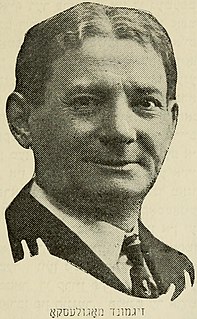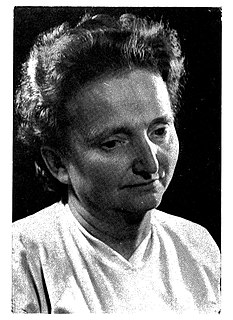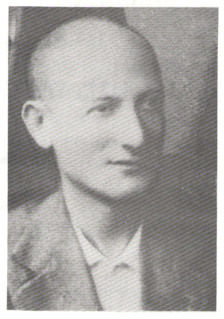Related Research Articles
The music of Israel is a combination of Jewish and non-Jewish music traditions that have come together over the course of a century to create a distinctive musical culture. For almost 150 years, musicians have sought original stylistic elements that would define the emerging national spirit. In addition to creating an Israeli style and sound, Israel's musicians have made significant contributions to classical, jazz, pop rock and other international music genres. Since the 1970s, there has been a flowering of musical diversity, with Israeli rock, folk and jazz musicians creating and performing extensively, both locally and abroad. Many of the world's top classical musicians are Israelis or Israeli expatriates. The works of Israeli classical composers have been performed by leading orchestras worldwide.

Brody is a city in Zolochiv Raion of Lviv Oblast (region) of western Ukraine. It is located in the valley of the upper Styr River, approximately 90 kilometres northeast of the oblast capital, Lviv. Brody hosts the administration of Brody urban hromada, one of the hromadas of Ukraine. Population: 23,335 .

Yiddish theatre consists of plays written and performed primarily by Jews in Yiddish, the language of the Central European Ashkenazi Jewish community. The range of Yiddish theatre is broad: operetta, musical comedy, and satiric or nostalgic revues; melodrama; naturalist drama; expressionist and modernist plays. At its height, its geographical scope was comparably broad: from the late 19th century until just before World War II, professional Yiddish theatre could be found throughout the heavily Jewish areas of Eastern and East Central Europe, but also in Berlin, London, Paris, Buenos Aires and New York City.

Abraham Goldfaden, also known as Avram Goldfaden, was a Russian-born Jewish poet, playwright, stage director and actor in the languages Yiddish and Hebrew, author of some 40 plays. Goldfaden is considered the father of modern Jewish theatre.

Boris Thomashefsky (1868–1939) was a Ukrainian-born Jewish singer and actor who became one of the biggest stars in Yiddish theatre.
Berl Broder (1817–1868), born Berl Margulis, was a Ukrainian Jew born in Podkamen, the most famous of the Broder singers and reputed the first to be both a singer and an actor. His nickname is the origin of the term Broder singer. Thirty of his songs survive; of these, 24 are in the form of dialogues, usually between craftsmen such as tailors or shoemakers; his songs are seen as a precursor to Yiddish theater.

Velvel Zbarjer, birth name Benjamin Wolf Ehrenkrantz, a Galician Jew, was a Brody singer. Following in the footsteps of Berl Broder, his "mini-melodramas in song" were precursors of Yiddish theater.

Sigmund Mogulesko — Yiddish: זעליק מאָגולעסקאָZelik Mogulesko, first name also sometimes spelled as Zigmund, Siegmund, Zelig, or Selig, last name sometimes spelled Mogulescu — was a singer, actor, and composer in the Yiddish theater in New York City. He was born in Kalarash, Bessarabia and began singing in the local synagogue choir. Before reaching adolescence, he was paid nearly three times what teachers made, to sing in the synagogue of Chişinău. Soon after moving to Bucharest, Romania, he was paid to sing in churches as well as synagogues, and started acting.

Israel (Yisrol) Grodner was one of the founding performers in Yiddish theater. A Lithuanian Jew who moved at the age of 16 to Berdichev, Ukraine, Russian Empire, the Broder singer and actor was in Iaşi, Romania in 1876 when Abraham Goldfaden recruited him as the first actor for what became the first professional Yiddish theater troupe. Jacob Adler remarks that as the only Lithuanian Jew in the early years of Yiddish theater, he deliberately spoke a different dialect of Yiddish on stage so that it would blend better with the other actors.

Abraham Sutzkever was an acclaimed Yiddish poet. The New York Times wrote that Sutzkever was "the greatest poet of the Holocaust."

Der Nister was the pseudonym of Pinchus Kahanovich, a Yiddish author, philosopher, translator, and critic.

Mordechai Gebirtig, born Mordecai Bertig, was an influential Yiddish poet and songwriter of the interwar period. He was shot by Germans in the Kraków Ghetto, occupied Poland, during the Holocaust. A number of his Yiddish songs are sung to this day, including Es brent, Reyzele, Moyshele Mayn Fraynd, and Kinder Yorn.
Shloyme Prizament (1889-1973), Jewish composer, actor in the Yiddish theater, and badkhn, son of Moyshe Prizament ."

Rachel Boymvol, sometimes spelled Baumwoll was a Soviet poet, children's book author, and translator who wrote in both Yiddish and Russian. Because of the popularity of her Soviet children's books, they were translated into multiple languages. After 1971 she emigrated to Israel and published a number of books of poetry in Yiddish.

Daniel Kahn & the Painted Bird is a Germany-based klezmer band founded by Jewish-American singer-songwriter and actor Daniel Kahn, originally from Detroit, Michigan. The band was formed in 2005 and is based in Berlin. They have released five albums through German world music label Oriente Musik. The name of the band comes from the title of the novel The Painted Bird by Jerzy Kosiński.

Fraydele Oysher was an American Yiddish theater actress and musical performer. She was one of the first female singers to publicly perform cantorial music. She was the mother of American actress and comedian Marilyn Michaels and Michael Sternberg, the sister of American actor and cantor Moishe Oysher, and the wife of Harold Sternberg, a Broadway and Metropolitan Opera performer. Throughout her career, she performed in the United States, Canada, South America, and Cuba.

Pepi Litman was a cross-dressing female Yiddish vaudeville singer associated with the Broderzinger movement. Litman led a popular traveling theater troupe around Europe, performing highly satirical songs while costumed as a male Khosid. Because she frequently performed costumed as a young boy or as a male dandy, she is considered a proto-Drag King performer. Pepi Litman made numerous 78rpm recordings which capture her energetic and virtuosic singing style, and which also stand as a document of Jewish life in Eastern Europe.

Zelig Leib Bardichever was a Yiddish poet and composer from Bessarabia. His simple yet elegant poems and songs were written in a folkloric style and described the lives and poverty of artisans and common Jews, and of details of life in Romanian towns in years gone by. Although he died young and many of his songs were not properly documented, some of them were published and performed by Leibu Levin and others who had heard and learned them during Bardichever's lifetime.

Joseph Brody (1877–1937) was an American Jewish composer who wrote prolifically for the Yiddish theatre as well as liturgical Jewish works. He taught George Gershwin and was a friend of Yossele Rosenblatt. His daughter Estelle Brody was a film actor.

Vera Rozanka, was a Russian-born Yiddish Theatre actor and manager, soprano, writer, radio performer, and recording artist. During her career, she shared the stage with many notables of the Yiddish Theatre world, including Aaron Lebedeff, Ben Bonus, Fraydele Oysher, Miriam Kressyn and Menasha Skulnik. Among her typical acts were to perform as non-Jewish Russian, Ukrainian or Romani characters in folk costumes, performing under the name "the yiddishe shikse" (Shiksa).
References
- 1 2 3 http://www.yivoencyclopedia.org/printarticle.aspx?id=2195 YIVO encyclopedia
- ↑ https://www.jewishvirtuallibrary.org/jsource/judaica/ejud_0002_0019_0_19780.html Jewish virtual library
- ↑ Zalmen Zylbercweig, Leksikon fun Yidishn teater, Book one, pp. 216-217